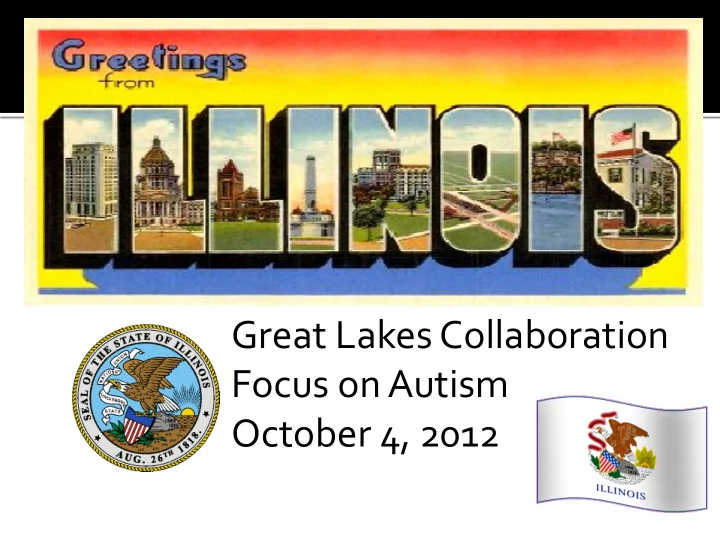

Great Lakes Collaboration Focus on Autism October 4, 2012
POPULATION BREAKDOWN Overall state population: 12,869,257 Chicago Metropolitan Area population: 9,729,825 (76%) Economic differences Chicago public school district: 617 • schools, ~400,000 students (86% low income). New Trier school district: 2 schools, • approx. 4,000 students (4% low income). Pope county school district: 2 • schools, 569 students (54% low income).
Autism prevalence urban vs. rural 1 in 144 8-year olds in Illinois has autism (2009-2010 public school data) • Cook county: 6,558 students with autism • Pope county: 2 students with autism Data from ISBE IDEA Count December 2002, 2004, 2010 provided by the Illinois Autism Training and Technical; Assistance Project IATTAP
Number of Children in Ilinois Receiving Special Education under the Category of Autism Ages 3-21 20000 17895 18000 16432 15224 16000 13764 14000 12239 number of children 12000 10608 9455 10000 8293 7193 8000 6125 5175 6000 4330 2305 2904 3662 4000 1960 2000 0 1996- 1997- 1998- 1999- 2000- 2001- 2002- 2003- 2004- 2005- 2006- 2007- 2008- 2009- 2010- 2011- 1997 1998 1999 2000 2001 2002 2003 2004 2005 2006 2007 2008 2009 2010 2011 2012 school year Source: Illinois State Board of Education IDEA Child Count Data December 1, 2011 Graph provided by the Illinois Autism Training and Technical Assistance Project IATTAP
Students with Autism in Illinois by Age Group 9000 8027 8000 7000 6627 6000 # of students 03-05 5000 4171 06-11 4000 12-17 18-21 2545 3000 2496 1757 2000 1248 1484 947 1000 641 378 197 Graph provided by the 0 Illinois Autism Training and Technical 1999-2000 2004-05 2011-12 Assistance Project IATTAP
PUNS is a database of people in Illinois with DD who need services. 4,898 individuals receiving waiver; 1,685 on wait- list Wait-list and provision of services not guaranteed. Children’s Home-Based Support Services Waivers Allows state to provide home and community- based services/supports for children and young adults (3-21 yrs.) so they may live at home with their families and avoid residential placement. 8/6/12
Data counts of children approaching national prevalence rates. Developing family/workforce competencies: • ASD Certificate program across disciplines; • Training and support across the lifespan for families in each region; and • Training in academic, residency and practice settings for health care providers.
Funding for community-based services and supports ensured through: • Reforms to Medicaid for better home and community based services & supports; • Leverage EPSDT mandate for the diagnosis and treatment of children (0-21) with ASD; and • Opportunities to utilize Community Health Centers and/or FQHCs in the provision of coordinated care for persons with ASD and DD (lifespan with a target of individuals 21+)
IL Dept. of Human Services Autism Task Force The Autism Program of Illinois (TAP) Illinois Autism Training & Technical Assistance Project (IATTAP) Early Intervention Bureau Autism Speaks – Chicagoland Chapter Illinois Chapter of the American Academy of Pediatrics (ICAAP)
Data collection Improved diagnostic reporting in EI system • Funding Ligas lawsuit allowed • adults with DD access services in the community Behavioral treatments • now reimbursed through early intervention system
Family competencies in supporting people with ASDs IATTAP model family support program; • TAP network of family support and bilingual workshops • Strong Autism Speaks Chicagoland Chapter • Grupo SALTO •
Workforce Competencies IATTAP developed a graduate level program for educators that is available • through IL State University (ISU); Autism Task Force is tracking trainings related to ASD to be posted in an • online Clearinghouse; ICAAP offers (at no charge) online training on screening and referral for • developmental concerns IL LEND targeted health care providers in underserved areas in southern IL for • training on early identification; and Updates in diagnostic trainings (e.g., toddler ADOS) have been made available • for providers in diagnostic programs. 8/6/12
Inconsistent data collection; Disparities & gaps in family supports; Non-standardized professional training; ESL issues; Disparities in diagnostics and service provision; Limited post-secondary transition services; Limited services for adults; & FUNDING!!!
Improve systematic collection of Early Intervention data; Expand Early Identification training to health care professionals in underserved areas; Expand Basic Level Online Autism Training Courses from IATTAP across state; Implement competency-based pediatric residency training on ASDs across residency programs state-wide Address funding disparities: Partner with Autism Speaks to enhance insurance • coverage Work with legislators regarding approval • mechanisms for FQHCs
Questions 8/6/12
Recommend
More recommend